Back boilers are illegal primarily due to their serious safety risks, particularly the threat of carbon monoxide poisoning. These outdated systems often fail to meet modern energy efficiency standards and can become fire hazards. Additionally, local authorities enforce strict regulations that require heating appliances to comply with higher safety and emissions standards. By shifting to safer alternatives, you can protect your home and environment. Discover the benefits of modern heating solutions that align with current regulations.
Key insights
- Back boilers are often illegal due to outdated safety standards, increasing the risk of carbon monoxide poisoning and fire hazards.
- Legislative changes have tightened regulations, making older back boilers non-compliant with modern energy efficiency and safety requirements.
- Many back boilers lack essential modern fire safety features, heightening the potential for dangerous overheating and ignition of nearby materials.
- Their high carbon emissions contribute significantly to environmental degradation, prompting stricter regulations on heating appliances.
- Continued use of back boilers can lead to penalties for homeowners due to non-compliance with updated heating regulations.
The History of Back Boilers
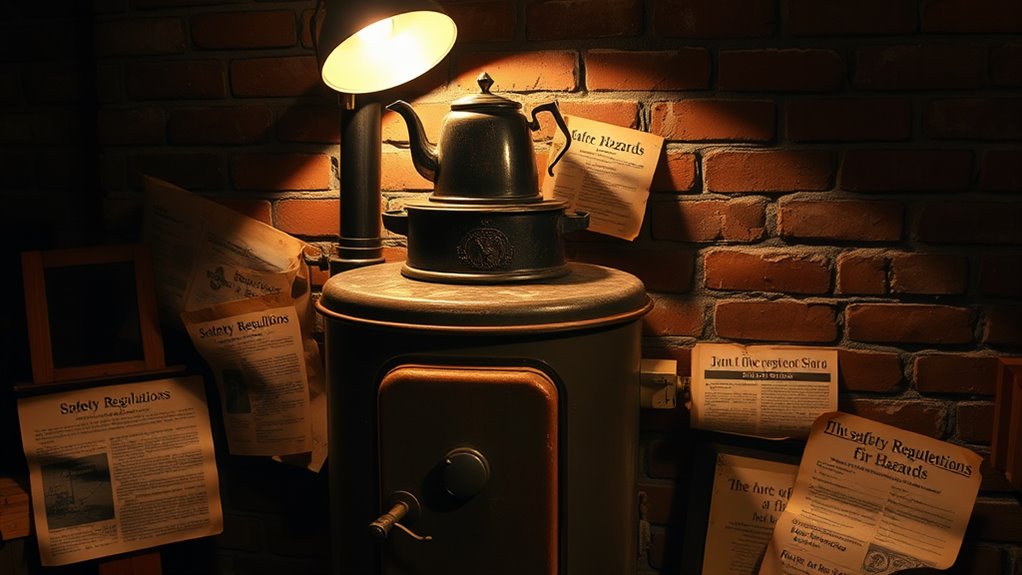
Back boilers have a long and storied history, evolving from simple heating solutions to more complex systems as technology advanced. Their historical significance lies in their role as a primary source of domestic heating for decades, particularly in the UK. Originally designed to fit behind fireplaces, they effectively utilized waste heat, showcasing early efficiency principles. As you explore their technological evolution, you'll see how these systems transformed from basic coal-fired models to gas and electric variants, adapting to changing energy demands and safety standards. This adaptability not only made back boilers popular but also highlighted their importance in the development of modern heating technologies. Additionally, the importance of regular servicing cannot be overlooked, as it ensures safe and efficient operation, reflecting the need for compliance with contemporary safety standards. Understanding this history can enhance your appreciation for how heating solutions have shaped our living environments.
Safety Concerns and Risks
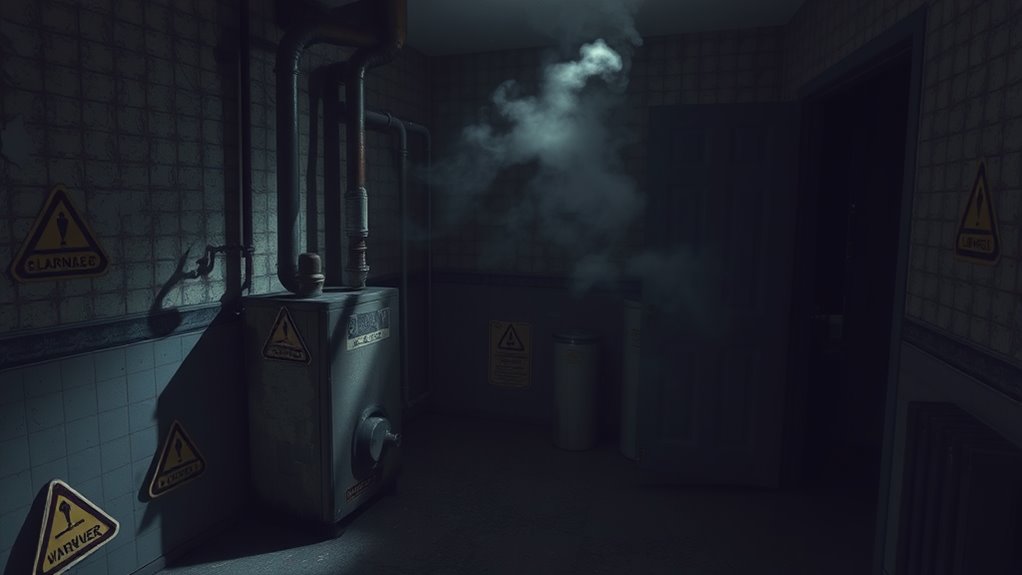
When using back boilers, you need to be aware of the serious safety risks they pose, particularly the threat of carbon monoxide poisoning. This colorless, odorless gas can accumulate in your home, leading to potentially deadly consequences. Additionally, the fire hazard potential from these outdated systems can put your entire property at risk, emphasizing the importance of seeking safer alternatives. Regular maintenance of HVAC systems is crucial to ensure safe operation and compliance with safety regulations, mitigating risks associated with outdated heating systems.
Carbon Monoxide Risks
Though many homeowners may not realize it, back boilers pose serious carbon monoxide risks that can jeopardize your safety. Carbon monoxide is a silent killer, and its presence can go undetected without proper carbon monoxide detection systems in place. These systems are essential, as they alert you to dangerous levels of this toxic gas. Unfortunately, back boilers are notorious for inefficient combustion, increasing the likelihood of carbon monoxide leaks. Current safety regulations emphasize the importance of having reliable heating systems that minimize these risks. By opting for safer alternatives, you not only comply with regulations but also protect your home and loved ones from the dangers of carbon monoxide exposure. Prioritize safety and consider replacing your back boiler today. Additionally, obtaining a Commercial Gas Safety Certificate ensures that any gas appliances in your home are regularly inspected for safety compliance.
Fire Hazard Potential
Fire hazards associated with back boilers can pose significant risks to your home and family. These systems, often installed behind fireplaces, can overheat and ignite combustible materials nearby, leading to devastating fires. The lack of modern fire safety features in older back boilers exacerbates this risk. You should also consider that heating regulations have evolved, making these units non-compliant with current safety standards. Regular maintenance and inspections, vital for any heating system, are often neglected with back boilers, increasing the likelihood of fire incidents. It's important to prioritize your home's safety by shifting to safer, more efficient heating solutions that adhere to today's regulations. Additionally, regular maintenance, such as commercial power flush, can help ensure that your heating system operates efficiently and safely. Don't compromise on fire safety; your family's well-being depends on it.
Carbon Monoxide Poisoning
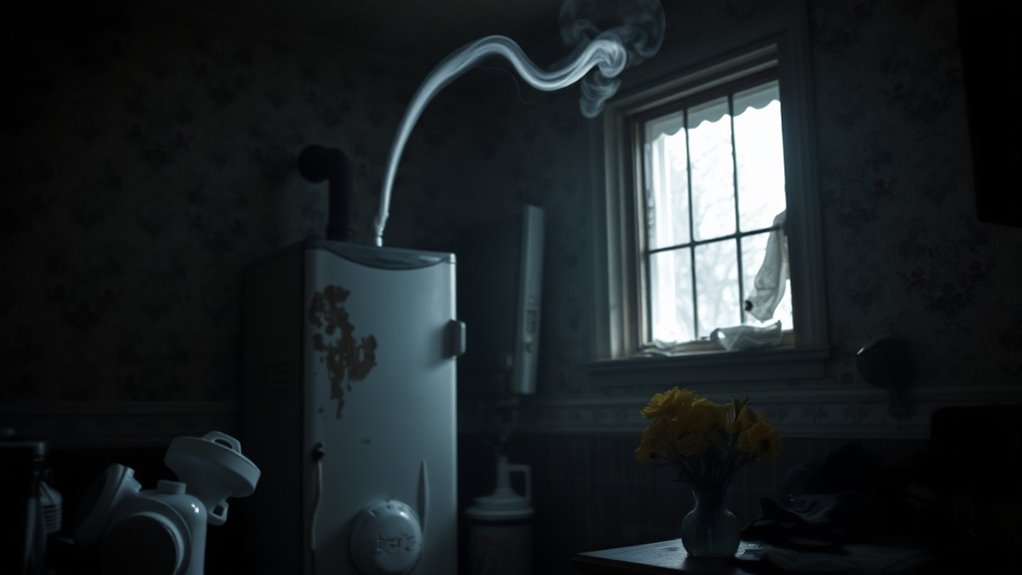
Carbon monoxide poisoning poses a serious threat, especially in homes with outdated heating systems like back boilers. Many homeowners underestimate the risks associated with these systems, which can leak this deadly gas if not properly maintained. Without effective carbon monoxide detection, you might not even realize there's a problem until it's too late. Safety regulations mandate the installation of detectors in modern homes, but older systems often fall short. You must prioritize your family's safety by replacing back boilers with compliant heating systems that adhere to current standards. Don't take chances; invest in proper ventilation and reliable carbon monoxide detection. Protecting yourself from this silent killer isn't just wise—it's essential for a safe living environment. Regular maintenance and servicing prevent boiler errors that can lead to dangerous situations like carbon monoxide leaks.
Environmental Impact
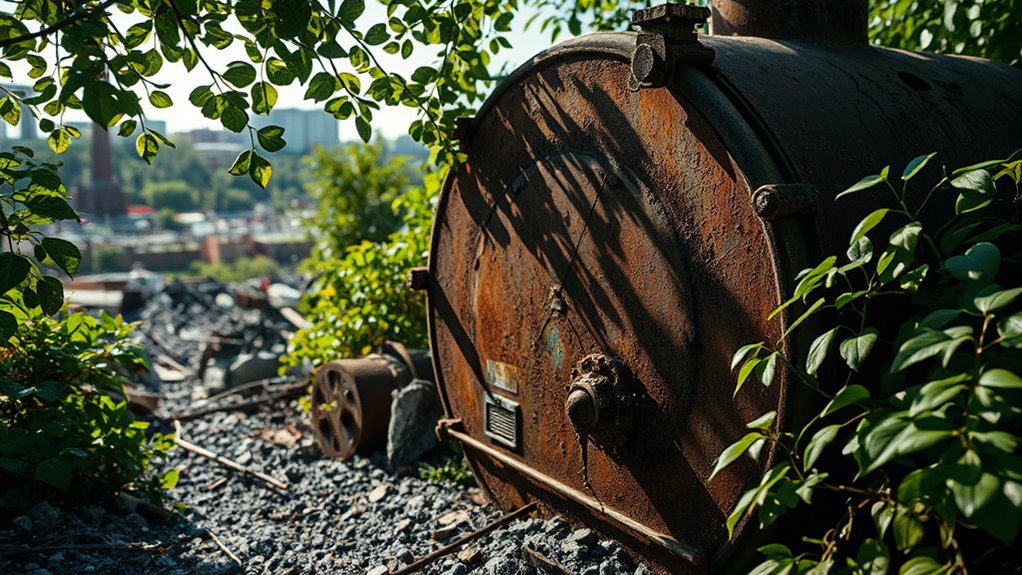
As outdated heating systems like back boilers continue to operate, they contribute markedly to environmental degradation. These systems are significant offenders in the fight against climate change due to their high levels of greenhouse emissions. The urgency for sustainable heating solutions has never been more critical. Here are three reasons why back boilers are detrimental to our environment:
- High Carbon Footprint: They release excessive CO2, worsening global warming.
- Inefficient Fuel Use: Back boilers often waste energy, leading to more fossil fuel extraction.
- Pollution: Their emissions include harmful particulates that adversely affect air quality.
Transitioning to more efficient and sustainable heating options is essential for reducing our carbon footprint and protecting the planet. Additionally, commercial heat pumps provide a viable alternative that can significantly lower greenhouse gas emissions. Don't wait—make the switch for a better future.
Energy Efficiency Standards
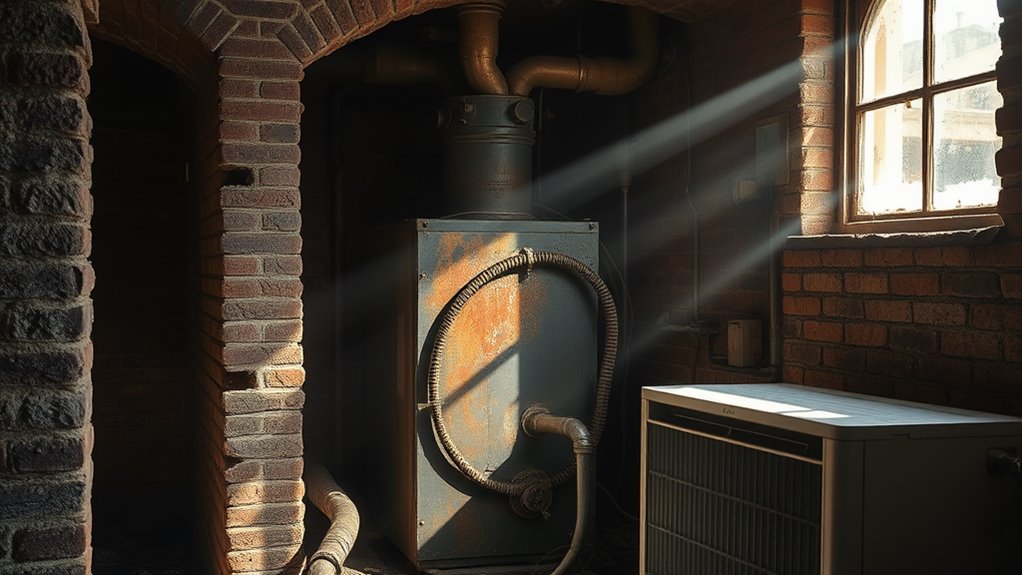
When considering energy efficiency standards, it's essential to understand the impact of energy performance regulations on your heating solutions. You need to evaluate how modern heating alternatives not only comply with these regulations but also minimize environmental harm. By making informed choices, you can greatly enhance your home's energy efficiency and reduce your carbon footprint. Utilizing advanced technology in heating systems can significantly improve overall efficiency and sustainability.
Energy Performance Regulations
Energy performance regulations play an essential role in shaping how buildings operate and consume energy, ensuring that efficiency standards are met to reduce environmental impact. For you, understanding these regulations is vital for achieving regulatory compliance and enhancing energy performance in your properties. Here are three key aspects to take into account:
- Minimum Efficiency Standards: Regulations set benchmarks for appliances and heating systems, ensuring they meet energy efficiency criteria.
- Building Inspections: Regular assessments help identify areas needing improvement, promoting energy-saving upgrades.
- Incentives for Compliance: Many regions offer financial incentives to encourage adherence to energy performance regulations, making it beneficial for you to invest in efficient systems. Additionally, implementing energy-efficient heating systems can significantly reduce carbon footprints and operational costs.
Environmental Impact Considerations
Understanding the environmental impact of energy efficiency standards is essential for both compliance and sustainability. By adhering to these standards, you contribute to significant sustainability measures that promote a healthier planet. Energy-efficient systems help reduce energy consumption, leading to lower greenhouse gas emissions. This translates to meaningful emission reductions, which not only comply with regulations but also demonstrate your commitment to environmental stewardship. Additionally, modernizing your heating systems can enhance overall efficiency, allowing you to save on energy costs while minimizing your carbon footprint. By prioritizing energy efficiency, you're not just meeting legal requirements; you're actively participating in a global effort to combat climate change and protect our future. Regular maintenance of your heating systems can further ensure optimal performance and longevity, thus supporting overall efficiency in energy use. Make the switch today for a more sustainable tomorrow.
Modern Heating Alternatives
As the demand for cleaner and more efficient heating solutions grows, modern alternatives have emerged that not only comply with stringent energy efficiency standards but also greatly enhance your home's comfort. Here are three options to evaluate:
- Heat Pumps: These systems transfer heat rather than generate it, offering efficient heating and cooling year-round, and considerably reducing energy consumption.
- Smart Thermostats: By learning your heating preferences, these devices optimize energy use, helping you save on utility bills while maintaining a cozy environment.
- High-Efficiency Boilers: Unlike older models, these boilers meet modern efficiency standards, providing reliable warmth with lower emissions. Regular maintenance, including monitoring low water pressure, is essential to ensure continued performance and prevent issues like the E119 error code.
Legislative Changes and Bans
While many homeowners still rely on back boilers for heating, legislative changes are driving a significant shift towards their ban. You should be aware that this legislative evolution stems from growing concerns over efficiency and safety. The regulatory framework surrounding heating appliances has tightened, pushing for higher standards that back boilers often fail to meet. As emissions standards become stricter, your reliance on outdated technology could lead to penalties or increased costs. Local authorities are increasingly enforcing these regulations, making it essential for you to stay informed. Changing to compliant heating solutions not only keeps you within legal boundaries but also enhances energy efficiency, ultimately reducing your energy bills and environmental impact. Don't wait for further regulations; act now to guarantee compliance and safety.
Alternatives to Back Boilers
If you're looking to replace your back boiler, there are several modern alternatives that offer improved efficiency and safety. Consider these options:
- Heat Pumps: These systems extract heat from the air or ground and transfer it indoors, providing efficient heating and cooling year-round. They can markedly reduce your energy bills.
- Solar Heating: Harnessing the sun's energy, solar heating systems can directly heat your water or support your heating system, making them eco-friendly and cost-effective in the long run.
- Combination Boilers: These compact units provide both heating and hot water on demand, eliminating the need for a separate water tank and saving valuable space.
Switching to one of these alternatives enhances your home's efficiency and aligns with current safety standards.
Cost Implications of Switching
Switching from a back boiler to a modern heating solution can have significant cost implications that you should consider. Conducting a thorough cost analysis is essential to understanding both the upfront and long-term expenses. While the initial installation of a new system may seem high, it's vital to factor in the financial benefits of increased energy efficiency and lower utility bills over time. Modern boilers often require less maintenance and have longer lifespans, translating to fewer unexpected costs. Additionally, you could qualify for government incentives that help offset initial expenses. By weighing these factors, you can make a more informed decision that not only enhances your home's comfort but also contributes to your financial health in the long run.
Future of Home Heating Solutions
As the demand for sustainable energy solutions grows, the future of home heating is shifting towards innovative technologies that prioritize efficiency and environmental responsibility. You'll find that integrating smart home technologies with renewable energy sources can transform your heating experience. Here are three key trends to take into account:
- Heat Pumps: These systems harness renewable energy from the environment, providing efficient heating and cooling.
- Smart Thermostats: They optimize energy use by learning your schedule, ensuring comfort while reducing costs.
- Solar Heating: Using solar panels, you can convert sunlight into heat, greatly lowering your carbon footprint.
Frequently Asked Questions
Can Back Boilers Be Used in Mobile Homes or Caravans?
Back boilers aren't typically recommended for mobile homes or caravans due to safety concerns and efficiency issues. Mobile home heating requires systems specifically designed for confined spaces, ensuring proper ventilation and combustion. Using a back boiler in a caravan might pose significant risks, including carbon monoxide poisoning. You should consider alternative heating solutions that meet safety standards and provide effective warmth without compromising your safety or the integrity of your mobile living space.
What Are the Best Alternatives to Back Boilers for Heating?
When considering the best alternatives to back boilers for heating, you should explore energy-efficient alternatives like combi boilers and heat pumps. These modern heating solutions not only provide effective warmth but also lower energy bills and reduce your carbon footprint. Radiant floor heating is another option that delivers consistent heat. By switching to these systems, you're investing in a more sustainable and comfortable home environment while enjoying the benefits of advanced technology.
Are There Any Exceptions to the Back Boiler Ban?
There are few exceptions explained concerning the back boiler ban. Some older models may remain in use if they meet specific safety and efficiency standards. However, you must stay updated with regulation updates, as local laws can change. It's important to consult with a qualified heating professional to guarantee compliance and safety. While these exceptions exist, consider modern alternatives that offer better efficiency and reliability for your heating needs.
How Do I Know if My Boiler Is a Back Boiler?
To identify if your boiler is a back boiler, look for specific features. Back boilers are typically installed behind a fireplace and have a flat panel design. They often lack a conventional flue pipe and may connect directly to the chimney. Check for a cold water inlet and hot water outlet pipes emerging from the unit. If you're unsure, consult a qualified technician who can confirm the boiler type and verify it's safe.
What Should I Do if I Have a Back Boiler Installed?
If you've got a back boiler installed, it's essential to evaluate back boiler maintenance and your removal options. First, consult a qualified heating engineer to assess its condition and safety. They can help you understand the risks and recommend whether to keep it or remove it. If removal is necessary, they'll guide you through the process, ensuring you comply with current regulations, and help you choose a safer, more efficient heating solution.
Summary
To sum up, the ban on back boilers stems from serious safety concerns, especially regarding carbon monoxide risks and environmental impacts. As energy efficiency standards tighten, evolving to safer, modern heating alternatives becomes essential not just for compliance, but for your well-being and the planet. By investing in updated systems now, you're not just adhering to legislation; you're also ensuring a more sustainable future. Embrace these changes, and you'll enjoy a safer, more efficient home heating solution.

